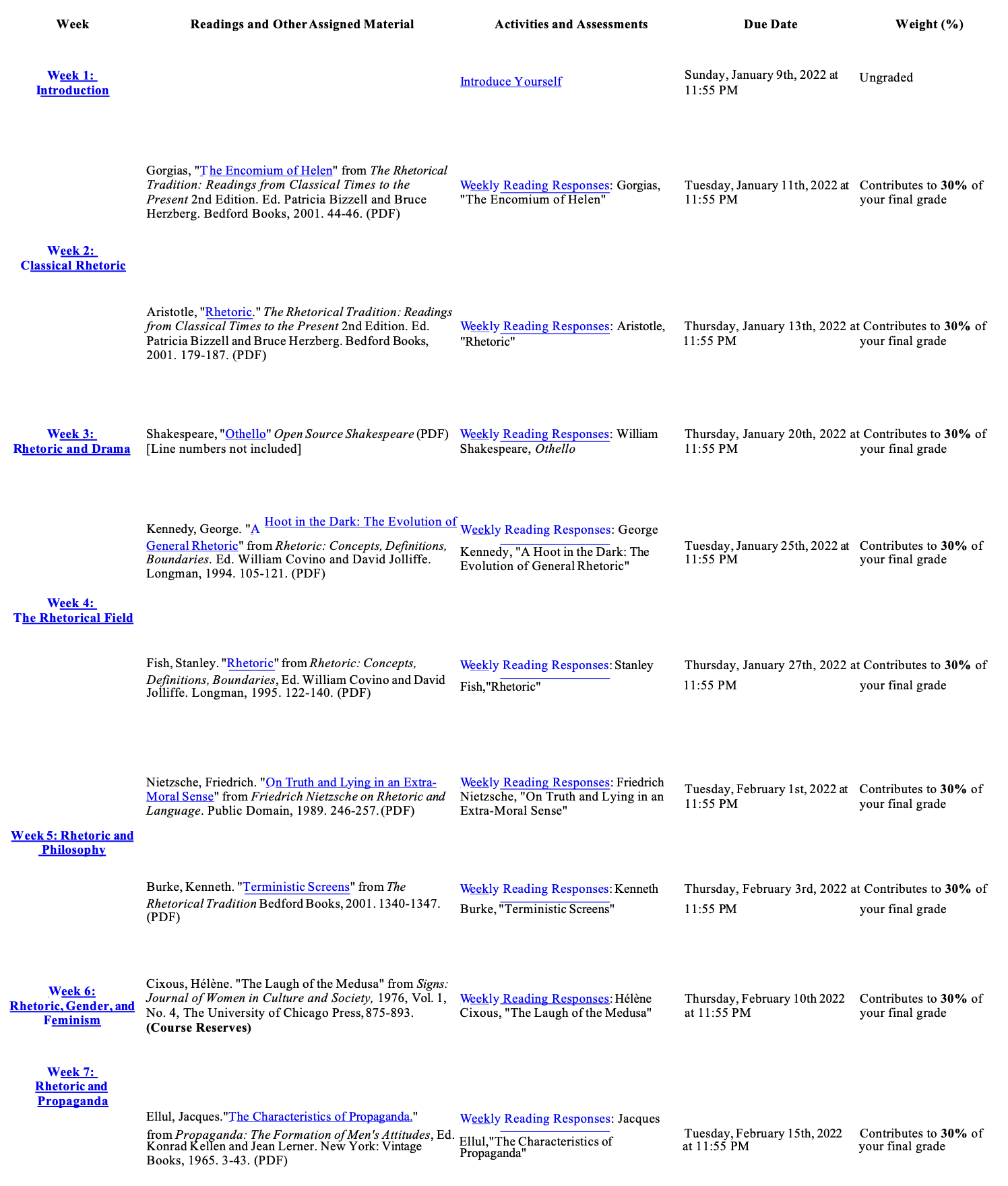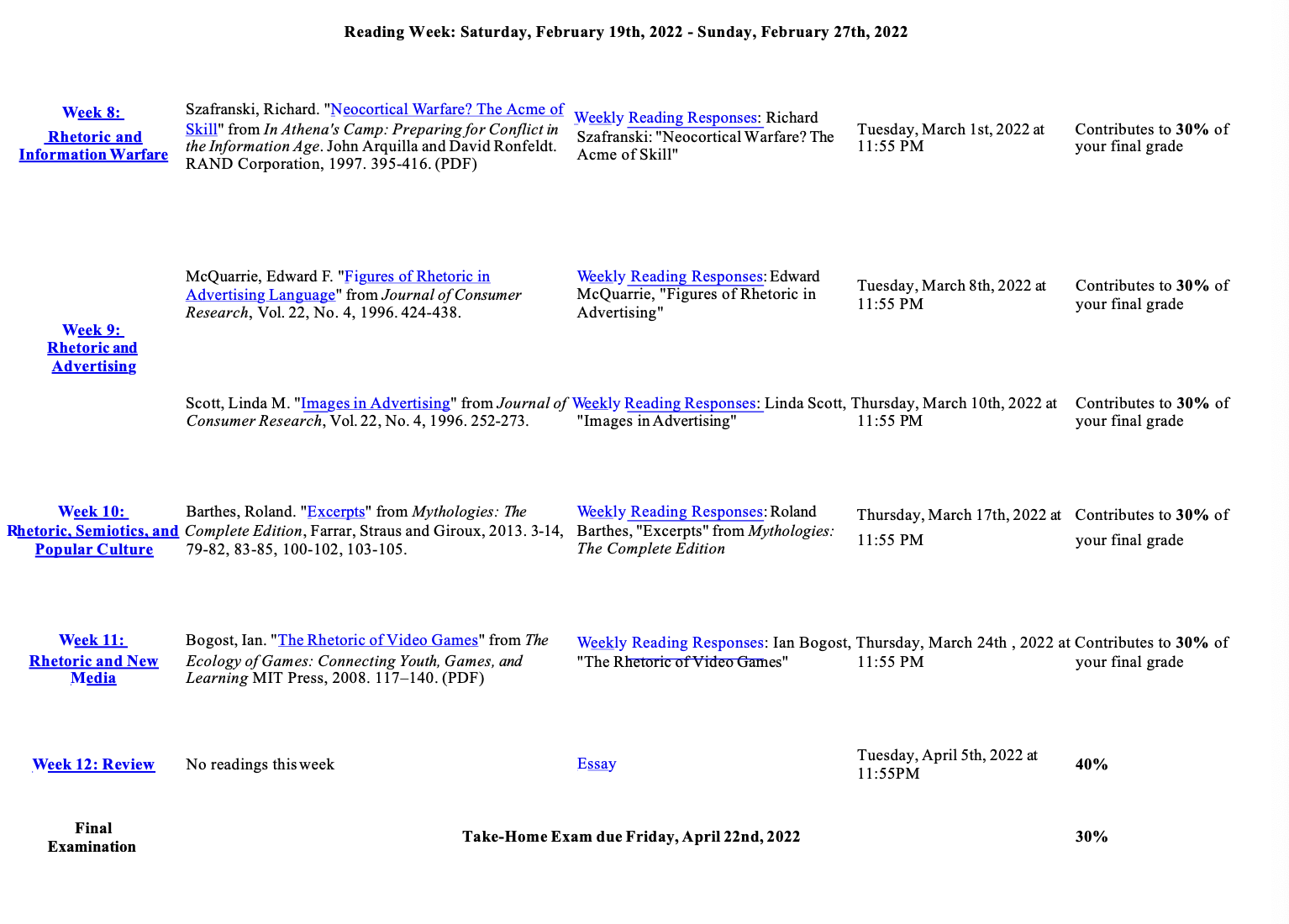ENGL 101B
W22 Gallagher
Course
Schedule 


Contact Information
Announcements
Your instructor uses the Announcements widget on the Course Home page during the term to communicate new or changing information regarding due dates, instructor absence, etc., as needed. You are expected to read the announcements on a regular basis.
To ensure you are viewing the complete list of announcements, you may need to click Show All Announcements. Discussions
A General Discussion topic* has also been made available to allow students to communicate with peers in the course. Your instructor may drop in at this discussion topic.
Contact Information
Dr. Heather Smyth - Instructor Associate Professor, English
Office Hours: 9-10 am Thursdays, in MS Teams
Announcements
Welcome to the course! I will use the Announcements widget on the Course Home page during the term to communicate new or changing information regarding due dates, instructor absence, etc., as needed. You are expected to read the announcements on a regular basis.
To ensure you are viewing the complete list of announcements, you may need to click Show All Announcements.
Contact Us
|
Who and Why |
Contact Details |
|
Instructor and TA Course-related questions (e.g., course content, deadlines, assignments, etc.) Questions of a personal nature |
Post your course-related questions to the Ask the Instructor discussion topic*. This allows other students to benefit from your question as well. Questions of a personal nature can be directed to your instructor. Instructor: Sara Gallagher s4gallagher@uwaterloo.ca I check email and the Ask the Instructor discussion topic* frequently and will make every effort to reply to your questions within 24 hours, Monday to Friday. When emailing me, please indicate the course code in the subject line. |
|
Technical Support Technical problems with Waterloo LEARN |
Include your full name, WatIAM user ID, student number, and course name and number. Technical support is available during regular business hours, Monday to Friday, 8:30 AM to 4:30 PM (Eastern Time). |
|
Who and Why |
Contact Details |
|
Student Resources |
Academic advice Student success WatCards Library services and more |
*Discussion topics can be accessed by clicking Connect and then Discussions on the course navigation bar above.
Course Description and Learning Outcomes
Description
The systematic study of effective communication—the art of rhetoric—dates back at least to the epics of Homer and flourishes today in countless academic disciplines and fields of business. In fact, the historical “empire” of rhetoric is so vast and enduring that it “digests regimes, religions, and civilizations” (Roland Barthes). This class seeks to introduce students to the essential concepts, frameworks, and controversies in the history and theory of rhetoric by analyzing key selections from foundational texts, both ancient and contemporary. In addition to demonstrating the relevance of rhetorical theory and criticism to a variety of social, intellectual, and cultural fields (law, politics, philosophy, literature, advertising, etc.), the class also explores emerging forms of rhetorical practice made possible by new media technologies, such as propaganda, computational gaming, and information warfare. Students will leave the class with a firm grasp of basic concepts of rhetorical theory, a sense of the history of rhetoric, and a deeper appreciation for rhetoric as an inventive, critical, multimodal, and multidisciplinary enterprise—what Quintilian calls an “encompassing art” (ars circumcurrens).
Learning
Outcomes
Upon
successful
completion
of
this
course,
you
should
be
able
to:
- Define basic rhetorical concepts
- Describe the historical scope of rhetoric
- Read texts critically
- Analyze artifacts rhetorically
- Appreciate rhetoric as an inventive, critical, multimodal and richly interdisciplinary enterprise
About the Course Author and Instructor
Sara Gallagher - Course Instructor
- Educational Background B.A. (Hons), M.A., English, Trent University
- PhD, English, University of Waterloo
Current Research
My
research
interests
include
African
American
literature
and
rhetoric,
the
history
of
the
book,
and
media
studies.
I
am
currently
preparing
a
manuscript
based
on
my
dissertation,
entitled
Black
Frontiers:
Race,
Region,
and
Myth
in
African
American
Westerns,
1854-1954,
which
looks
at
the
literary
history
of
Black-authored
Westerns.
Hobbies/Interests
When
not
researching
or
teaching,
I
enjoy
going
for
hikes,
cooking,
listening
to
jazz,
and
painting.
Michael MacDonald - Course Author
- Educational Background BA, English, University British Columbia
- MA, Rhetoric, University of California at Berkeley PhD, Rhetoric, University of Calfornia at Berkeley
Current Research
Research interests include the history and theory of rhetoric, rhetoric and philosophy, and media studies. I am currently finishing a large editorial project: the Oxford Handbook of Rhetorical Studies (1200 pages), which includes 60 chapters that trace the evolution of rhetoric across disciplines.
Philosophy of Teaching
My philosophy of teaching emphasizes the close reading of primary texts and takes an interdisciplinary approach to rhetoric that encourages students to draw their own connections between rhetoric and other fields in the sciences and humanities.
Hobbies/Interests/Sports
When
not
involved
in
research,
I
enjoy
exercising,
cooking,
playing
the
drums,
and
composing
music.
Family/Children/Travel
I am married, and often travel to my wife's home city of Chicago, where I also taught for a number of years (at the University of Illinois at Chicago). I enjoy traveling to Europe for conferences and lectures, and I taught for a semester at the American University of Paris.
Materials and Resources
Textbook
There is no textbook to purchase for this course. Most required readings are available for download, in PDF form, from the Course Schedule and the Content Modules. If you prefer hard copies, they can be purchased through the W Store listed below.
For textbook ordering information, please contact the W Store | Course Materials + Supplies.
For your convenience, you can compile a list of required and optional course materials through BookLook using your Quest userID and password. If you are having difficulties ordering online and wish to call the Waterloo Bookstore, their phone number is +1 519 888 4673 or toll-free at +1 866 330 7933. Please be aware that textbook orders CANNOT be taken over the phone.
Course
Reserves
Course
Reserves
can
be
accessed
using
the
Library
Resources
widget
on
the
Course
Home
page.
Resources
Library
services
for
Co-op
students
on
work
term
and
students
taking
online
courses
Grade Breakdown
| Activities and Assessments | Weight |
|---|---|
| Introduce Yourself | Ungraded |
| Weekly Reading Responses |
30% |
| Essay | 40% |
| Final Examination | 30% |
Course and Department Policies
Late Policy
Late Weekly Reading Responses cannot be submitted on the discussion boards so it is wise to get them in before the due date. If you cannot submit them by the due date, please contact me as soon as possible for an extension. Weekly responses granted an extension will be submitted by email. Late reading responses will receive a deduction of 5% per day unless an extension is asked for prior to a due date.
In the case of late Essays, the instructor reserves the right to subtract 5% per day from the assignment grade if no extension is asked for prior to the essay's due date.
I encourage all students who are struggling to keep up with the course content for whatever reason to please contact me as soon as possible. I urge that you do this because multiple late assignments can result in a large deduction of your final grade.
Intellectual Property
Students should be aware that this course contains the intellectual property of their instructor, TA, and/or the University of Waterloo. Intellectual property includes items such as:
- Lecture content, spoken and written (and any audio/video recording thereof);
- Lecture handouts, presentations, and other materials prepared for the course (e.g., PowerPoint slides);
- Questions or solution sets from various types of assessments (e.g., assignments, quizzes, tests, final exams); and
- Work protected by copyright (e.g., any work authored by the instructor or TA or used by the instructor or TA with permission of the copyright owner).
Course materials and the intellectual property contained therein are used to enhance a student’s educational experience. However, sharing this intellectual property without the intellectual property owner’s permission is a violation of intellectual property rights. For this reason, it is necessary to ask the instructor, TA and/or the University of Waterloo for permission before uploading and sharing the intellectual property of others online (e.g., to an online repository).
Permission from an instructor, TA or the University is also necessary before sharing the intellectual property of others from completed courses with students taking the same/similar courses in subsequent terms/years. In many cases, instructors might be happy to allow distribution of certain materials. However, doing so without expressed permission is considered a violation of intellectual property rights.
Class and University Policies
Late essays will be accepted without penalty only if prior permission has been granted. Otherwise, the penalty will be 2% per day, including weekends.
I will normally reply to email messages within 24 hours, weekends excepted.
All sources of information that you use in your written work in this class must be cited fully and scrupulously. If I suspect that you have committed an academic offense, including plagiarism, I will report it to the Associate Dean; if the offense is confirmed, the normal result is a failing grade on the assignment and a further five marks off the course grade.
Academic Integrity
In order to maintain a culture of academic integrity, members of the University of Waterloo are expected to promote honesty, trust, fairness, respect and responsibility. Check the Office of Academic Integrity for more information (https://uwaterloo.ca/academic-integrity/).
Discipline
A student is expected to know what constitutes academic integrity, to avoid committing academic offenses, and to take responsibility for his/her actions. Check the Office of Academic Integrity for more information. A student who is unsure whether an action constitutes an offence, or who needs help in learning how to avoid offences (e.g., plagiarism, cheating) or about “rules” for group work/collaboration should seek guidance from the course professor, academic advisor, or the undergraduate associate dean. For information on categories of offences and types of penalties, students should refer to https://uwaterloo.ca/secretariat-general-counsel/policies-procedures-guidelines/policy-71. For typical penalties, check Guidelines for the Assessment of Penalties, https://uwaterloo.ca/secretariat-general-counsel/policies-procedures-guidelines/guidelines/guidelines-assessment-penalties.
Grievance
A student who believes that a decision affecting some aspect of his/her university life has been unfair or unreasonable may have grounds for initiating a grievance. Read Policy 70 - Student Petitions and Grievances, Section 4, https://uwaterloo.ca/secretariat-general-counsel/policies-procedures-guidelines/policy-70. When in doubt, please be certain to contact the department’s administrative assistant who will provide further assistance.
Appeals
A decision made or penalty imposed under Policy 70 - Student Petitions and Grievances (other than a petition) or Policy 71 - Student Discipline may be appealed if there is a ground. A student who believes he/she has a ground for an appeal should refer to Policy 72 - Student Appeals, https://uwaterloo.ca/secretariat-general-counsel/policies-procedures-guidelines/policy-72.
Note for Students with Disabilities
The AccessAbility Services office, located in Needles Hall, Room 1401, collaborates with all academic departments to arrange appropriate accommodations for students with disabilities without compromising the academic integrity of the curriculum. If you require academic accommodations to lessen the impact of your disability, please register with the AccessAbility Services office at the beginning of each academic term.
Mental Health Support
On Campus
- Counselling Services: counselling.services@uwaterloo.ca/ 519-888-4567 xt 32655
- MATES: one-to-one peer support program offered by Federation of Students (FEDS) and Counselling Services
- Health Services Emergency service: located across the creek form Student Life Centre
Off campus, 24/7
- Good2Talk: Free confidential help line for post-secondary students. Phone: 1-866-925-5454
- Grand River Hospital: Emergency care for mental health crisis. Phone: 519-749-433 ext. 6880
- Here 24/7: Mental Health and Crisis Service Team. Phone: 1-844-437-3247
- OK2BME: set of support services for lesbian, gay, bisexual, transgender or questioning teens in Waterloo. Phone: 519-884-0000 extension 213
Full details can be found online at the Faculty of Arts website (https://uwaterloo.ca/arts/get-mental-health-support-when-you-need-it).